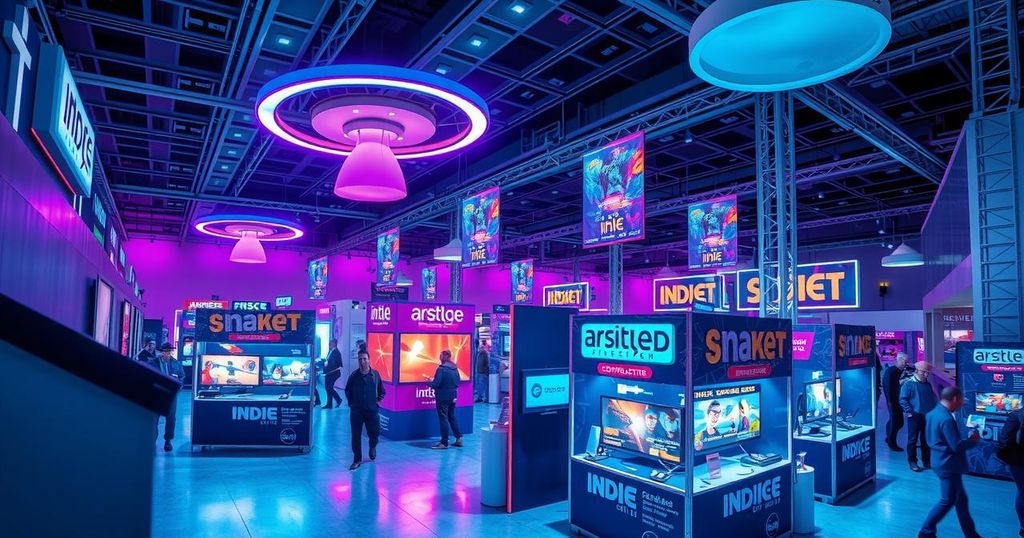AI Joins the Game: How Artificial Intelligence is Changing the Video Game Industry
- AI is reshaping the gaming landscape, prominently featured at GDC 2025.
- Emotion-detecting wristbands could customize gameplay experiences for players.
- Many attendees face challenges in finding jobs in a competitive market.
- New AI-driven technologies promise efficiency in game design and development.
- Roblox’s new AI features empower users to create 3D content easily.
Artificial Intelligence Dominates at the Game Developers Conference
AI Revolutionizes Gameplay and Development The 2025 Game Developers Conference (GDC) buzzed with energy this year, but it felt different, maybe even a little lighter. Gone were the grandiose booths of giants like Sony PlayStation and Epic Games, replaced by a bustling scene of indie developers showcasing their imaginative creations. Tiny stalls lined up, with eager crowds hovering over displays featuring innovative games and experimental tech. Yet, amidst these creative exchanges, one undeniable trend has taken center stage this year: artificial intelligence.
Innovations Transform Player Engagement and Interaction
Emotional Insight Transcends Traditional Gaming The essence of this AI movement was encapsulated in the demonstration by Ovomind, a startup showing off a horror game like no other. Instead of immersive VR headsets and exaggerated gestures, they showcased a game powered by emotion-detecting technology through a simple wristband. CEO Yann Frachi illuminated how the device reads emotions by tracking heart rates and skin responses, sending that data to an AI model. This revolutionary feedback opens the door for a customized gaming experience, where gameplay adapts based on real-time emotional cues, ensuring players are never bored. Each session can be uniquely crafted based on how one feels—an absolute game changer. The company has grand plans too; they’re not just sticking to this wristband—they dream of integrating this technology into everyday smartwatches. It’s a vision that could redefine how players experience games, always aligning the gameplay with their emotional states.
Industry Struggles Amid Influx of New Technologies
The Industry Faces Job Market Challenges As thrilling as these advancements are, the conference also highlighted the stark realities facing the game development industry. For many attendees, finding employment remains a formidable challenge. Ryan Dunagan, a game programming professor, reflected on the current landscape, marked by a surplus of talent against a backdrop of mass layoffs. Newcomers like Robert Breglio arrived optimistic but tempered by the understanding that landing a position in this market resembles completing a complex level in a video game: daunting and filled with obstacles. This sentiment was echoed last year when industry veteran Louis Castle viewed these issues as symptomatic of a deeper crisis—expensive content development processes. Conversely, some positives emerged during the pandemic, where gaming surged in popularity as people sought solace indoors. Nevertheless, as Chris Hewish from Xsolla pointed out, growth rates, while still on the rise, have plateaued, leading studios to reevaluate their approaches. Can AI streamline processes to counteract these hurdles? Castle hopes so, suggesting that efficiencies brought on by AI could enhance profitability without sacrificing quality.
AI Enables Creativity While Addressing Industry Concerns
AI as a Creator’s Assistant, Not a Replacement While technological fears abound, there’s optimism tinted with realism about the future of AI in gaming. For instance, Vicon is developing a “markerless” motion capture technology that could revolutionize the animation process yet still coexist alongside traditional methods. This could allow animators to focus less on setup intricacies and more on creative expression—something invaluable amid growing demands for output. IGDA executive director Jakin Vela voiced concerns about the necessity of ensuring AI models operate ethically, particularly when it comes to training data sourced from artists in the industry. Roblox, a platform transforming millions into creators, is also on the AI frontier with the launch of Cube, a new generative model aimed at simplifying 3D content creation, thus empowering users—especially younger ones—to express their creativity seamlessly. Imagine typing a description and instantly seeing that world materialize; this is the future Bhat envisions. With AI not only assisting but blending into the creative process, there’s great potential for a new generation of developers to emerge, enriching the gaming landscape further.
The incorporation of artificial intelligence into the gaming world is redefining both gameplay and development processes, presenting unique opportunities and challenges. While emotion-detecting wearable technology promises personalized experiences, a saturated job market and concerns over ethical AI practices loom large over the industry. If executed thoughtfully, AI could serve not as a replacement, but as a valuable partner for human creativity in the gaming revolution.




Post Comment